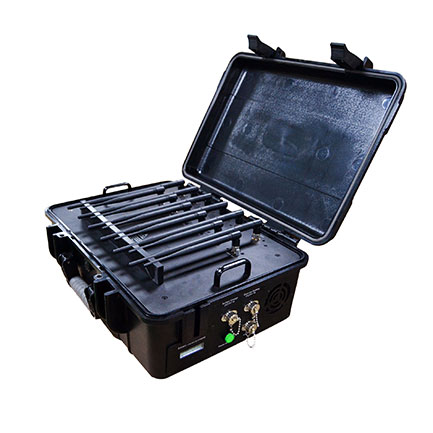Birds Against Drones
Unmanned interceptor drones might be practical, but if you're the kind of person who wants to carve out a few notches in bad road signs, then you might want to look at anti-drone birds - especially eagles already Trained to troubleshoot drones in the sky. In fact, some of these birds are even able to grab drones and bring them all the way back to the trainer. If you're concerned about whether this process is harmful to birds, don't worry: Birds are smart enough to let it shed without clipping claws. These pigeons can only be used in the Netherlands and only in the police force, but it is conceivable that other countries will follow suit in some form.
Drone jammer
If you need a more subtle method than the physical interception, then frequency jamming may be what you need, and a drone jammer is one such solution. It scans the sky for drones and jams their control signals with its own high-power radio signals.
Or, if you need a more portable option, a precision counter-drone rifle that uses targeted radio signals to interrupt drone control, much the same way that counter-drone defense systems operate. It currently has a range of more than 5 kilometers but may reach even greater distances in future versions. Then there is the use of radar jammers.
Unmanned blinding laser
Anti-drone lasers are a bit like anti-drone jammers, except instead of jamming the drone's control signals, they interfere with its cameras. Digital cameras use a light sensor for visual information, so if you overload that sensor with too much light, you can turn it off.
Have you ever taken a video from your house and after a few seconds of stepping outside, everything was bright and white, didn't you? This is basically how a blinding laser works. All you need is a low-powered laser pointer and some good targets. But be careful when using it.
UAV detection system
Back in 2013, a group of engineers and computer scientists started a crowdfunding campaign called DroneShield. Powered by the Raspberry Pi core, it is able to detect the presence of a drone via a microphone, which enables it to pick up frequencies that humans cannot hear. Once processed, the signal is compared to a database to separate it from everyday noise and to confirm if it's a drone, and if so, the device will send you a notification that there's a drone nearby.
Drone hijacking
An important thing about drones is that they are never 100% adverse to hackers, just like computers and mobile devices are never fully protected. Keep that in mind if you plan to buy your own drone.
The problem is, this weakness can always be exploited, as demonstrated when security researchers remotely hijacked a $35,000 police drone from a mile away. If government drones can be banned in this way, it's reasonable to assume that most consumer drones won't stand a chance either.
Not that you should bypass hijacking drones, but in the future, we may see sabotage devices that use these vulnerabilities to stun the sky and keep the peace.

Create a no-fly zone
Maybe you're fine with drones taking to the skies, but you don't want them peeking out of your windows or accidentally wandering around your home. In this case, you should support the growing movement of "no man's land" preventing drones from flying through certain airspaces. Some drone makers have even co-created no-fly zones. If you add your address to their database, any drone created by these manufacturers won't be able to fly over your property due to built-in GPS-based limitations.
Formulate relevant laws
If all else fails, the last thing you can do is push for laws that protect citizens' privacy from drones. Bills have been popping up since the drone mania really took off in 2013, and some of them have even passed laws, but we still have a long way to go.
The good news for privacy advocates is that both parties agree and want to "prevent high-tech window peeping." Drone enthusiasts, on the other hand, argue that these privacy concerns are based on misinformation and that the law shouldn't clasp the drone industry before it blooms. Ideally, a middle ground would be found, but until then, we're at an impasse where privacy threats are real and we don't have the tools in place to protect ourselves. The law may end up being the only effective defense.
Are you worried about drones invading your privacy? What steps have you taken to ensure that your privacy rights are not violated? Should drones be banned?





